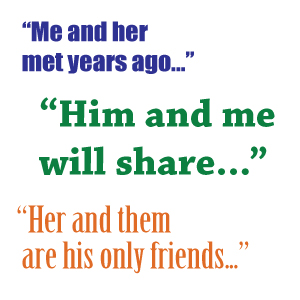Recently a friend and I were discussing what’s known in some circles as “substandard English.”
To be specific: Her and me were having a little conversation about “her and me.”
My friend confessed to thinking poorly of native speakers who habitually violate rules of grammar. One of the most grating errors for her was the use objective pronouns as the subjects of a sentence (For example, “Him and me are having an argument.”) My friend felt badly about her reaction, but said that she couldn’t control it, even with transgressors she thought well of otherwise.
 I commiserated. A sentence such as “Him and me went to the mall” has a fingernails-on-the-chalkboard quality to my ear. But while I agreed that this particular usage was lamentable, I predicted that it would become acceptable English within our lifetimes.
I commiserated. A sentence such as “Him and me went to the mall” has a fingernails-on-the-chalkboard quality to my ear. But while I agreed that this particular usage was lamentable, I predicted that it would become acceptable English within our lifetimes.
If a language is alive and well, changes are inevitable. (Latin’s not evolving much these days.) But that doesn’t mean that all changes come easily.
On the one hand, changes that are useful, such as words to describe technological developments, will be quickly absorbed. They don’t sound wrong, they just sound new.
But changes that aren’t useful, such as the use of “her and me” as paired sentence subjects, will meet resistance from everyone for whom they sound incorrect.
Curiously, speakers who would say “him and me ate breakfast” would never say “me ate breakfast” or “him ate breakfast.” Apparently using a single objective pronoun as a subject still sounds improper even to the language barbarians among us.
That’s why, on October 7, while scanning a brief item in the “On Campus” section of the Wisconsin State Journal, I was stunned to encounter the following passage:
Her and others in the Hmong community criticized the university…
and worse, because it seemed a further degradation:
Her is a Madison-based advocate…
I choked on my coffee. If this was acceptable to my local newspaper, then my prediction was fulfilled and my lifetime was going to be a lot shorter than I’d thought.
Then, on my way to the depths of despair, I noticed that the offending sentence referred to a man named Peng Her. Relief was immediate. Not yet, I thought. Not yet.
Still, it’s only a matter of time.
